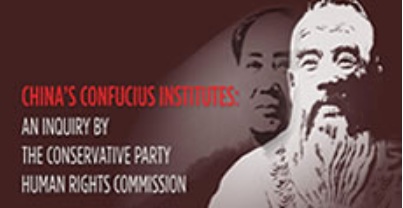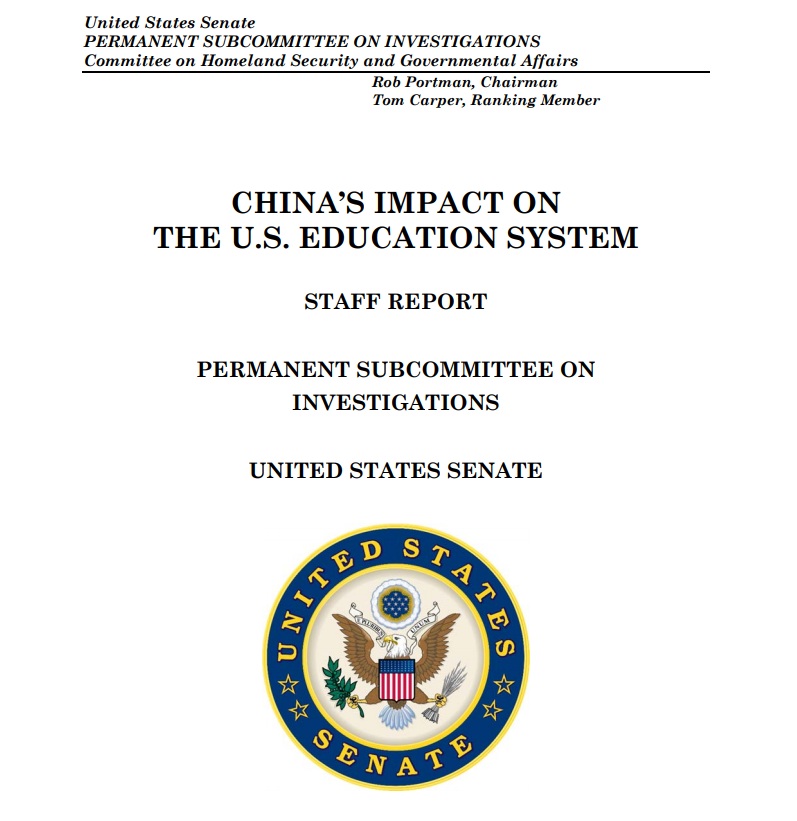 In Britain, the Conservative Party Human Rights Commission has called for a review of the current agreement between British institutes and the Confucius Institute in a report published on February 18 entitled China’s Confucius Institutes: an Inquiry by the Conservative Party Human Rights Commission. The Commission said China’s Confucius Institutes in schools and universities are the mediums through which the Chinese Communist Party extends their propaganda efforts and “threaten academic freedom and freedom of expression” by suppressing their critics.
In Britain, the Conservative Party Human Rights Commission has called for a review of the current agreement between British institutes and the Confucius Institute in a report published on February 18 entitled China’s Confucius Institutes: an Inquiry by the Conservative Party Human Rights Commission. The Commission said China’s Confucius Institutes in schools and universities are the mediums through which the Chinese Communist Party extends their propaganda efforts and “threaten academic freedom and freedom of expression” by suppressing their critics.
According to the Hong Kong Free Press, the report came in the wake of the closure of 27 Confucius Institutes at universities around the world. Tibet advocacy groups made submissions to the Conservative Party’s Inquiry and many of their suggestions were incorporated into the report.
The Confucius Institute was founded in 2004 as a non-profit public educational organisation affiliated with China’s ministry of education and which claim to promote Chinese language and culture. However, contrary to these claims, the British Conservative Party report said that in 2007 the then head of propaganda for the Chinese Communist Party, Li Changchu, described the Confucius Institutes as “an important part of China’s overseas propaganda set-up,” and in 2010, Xu Lin, the director-general of the Hanban, an agency that oversees Confucius Institutes, said “Confucius Institutes … are an important part of soft power. Because we want to expand our influences, we do not deny this. We agree.”
“The evidence we received raises very serious questions about the influence which Confucius Institutes may have in British universities and schools. We welcome and encourage language teaching and cultural exchange, but we believe a review is necessary to assess whether Confucius Institutes represent a threat to academic freedom, freedom of expression, other basic rights and indeed national security. […]” said Fiona Bruce MP, chair of the commission in a statement posted on their website.
The Commission’s report mentions the ban on discussions in Confucius Institutes worldwide on the three topics China deems “sensitive”: the Tiananmen massacre, Tibet and Taiwan.
The report recommends that all British institutes suspend their agreement with Confucius Institutes until the review is completed and that transparency can be ensured from the Confucius Institutes based in the United Kingdom.
 Meanwhile in the United States the Senate released a 93-page report on February 27, China’s Impact on the US Education System condemning Confucius Institutes and saying that without major changes, these institutes operating in numerous American campuses and schools should shut down, reports Politico, the magazine claiming to provide to be the dominant source for politics and policy in power centers across every continent. The report mentions China’s funding of language and culture centers in over 100 US universities, saying the centres are strictly monitored and constitute a threat to academic freedom.
Meanwhile in the United States the Senate released a 93-page report on February 27, China’s Impact on the US Education System condemning Confucius Institutes and saying that without major changes, these institutes operating in numerous American campuses and schools should shut down, reports Politico, the magazine claiming to provide to be the dominant source for politics and policy in power centers across every continent. The report mentions China’s funding of language and culture centers in over 100 US universities, saying the centres are strictly monitored and constitute a threat to academic freedom.
The US Senate’s Permanent Subcommittee on Investigations reports that China-funded educational organisations exist not only in universities: there are 519 elementary, middle and high schools in the United States with China’s Confucius Institutes.
The report continues, “Confucius Institute funding comes with strings that can compromise academic freedom. The Chinese government approves all teachers, events, and speakers. Some US schools contractually agree that both Chinese and US laws will apply. The Chinese teachers sign contracts with the Chinese government pledging they will not damage the national interests of China. Such limitations attempt to export China’s censorship of political debate and prevent discussion of potentially politically sensitive topics. […] As one US school administrator explained to the Subcommittee, when something is ‘funded by the Chinese government, you know what you’re getting’.”
The report says that Confucius Institutes are part of China’s long-term strategy saying, “Confucius Institutes’ soft power encourages complacency towards China’s pervasive, long-term initiatives against both government critics at home and businesses and academic institutions abroad”.
It further added that teachers and directors of these Chinese institutions in the US are selected by the Chinese government and “there is little-to-no transparency into how the Chinese government selects the individuals that schools must choose from. Nor did US school officials interviewed by the Subcommittee know if candidates would meet the school’s hiring standards.”
The US Senate report calls for “Transparency and Reciprocity” from China. “Absent full transparency regarding how Confucius Institutes operate and full reciprocity for US cultural outreach efforts on college campuses in China, Confucius Institutes should not continue in the United States,” said the report.
The report also accused schools and universities of covering up their Chinese government funding: “Nearly 70 percent of US schools and colleges that received over $250,000 per year from the Chinese government failed to report that amount to the Education Department”.




 Print
Print Email
Email